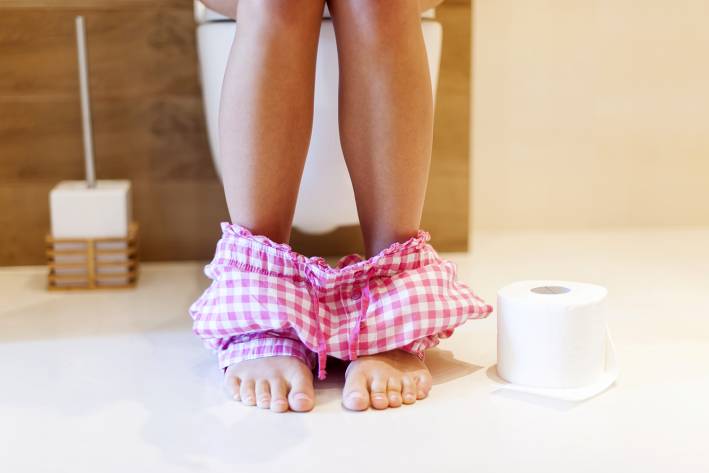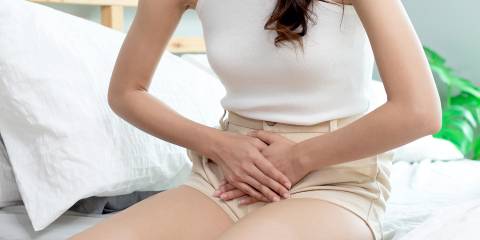Urinary incontinence and bladder leakage affects an estimated 50 percent of all women, yet we rarely talk about it – or seek help.
The sad statistics show that as low as 25 percent of women suffering with this embarrassing issue seek treatment, and those women are usually given a prescription bladder medication that has a side effect of dementia!
I received an email from a dear friend asking me to address this highly sensitive issue, and I think she accurately summarizes the heart of the matter:
“Ann Louise, I have a topic I would love to see you write about. After having 6 kids I have some urine leakage when I cough, sneeze, jump on a trampoline, etc.
There are a lot of women in my age group (over 40) who are newly single, and I’m sure they must be struggling with the same issue I am.
When I think about becoming sexually active again, this bladder issue affects my confidence and holds me back (especially with younger men).
I would love to see you write about urinary incontinence, and address all the issues around it – how it affects the activities we choose, our sexuality, our exercise routines (lifting heavy weights or straining is a problem), and even our choice of undergarments. I’d like to see what choices we have.
For instance, we have the menstrual cup now as an option for monthly cycles, but what do we have besides chemically laden pads for urine leakage? What else can women do at home to resolve this issue and feel more confident again?”
Fortunately, urinary incontinence isn’t something you need to medicate or tolerate – there are new, innovative solutions that promise lasting relief. I understand many women are too private to seek out physical therapy for their pelvic floor, and using a pessary is not only messy but inconvenient for sexual spontaneity.
The first solution I want to introduce you to is one I’ve personally had done, and I’m very happy with the results.
Rejuvenation for Your Sensitive Tissues
Urinary incontinence affects all areas of your life, from how you exercise to which undergarments you choose – and your sexuality as well.
It’s often a result of the weakening or atrophy of tissues in the surrounding area, including the vagina. The bladder begins to bulge down into the vagina when the supportive tissues have begun to weaken and stretch, or even atrophy.
This is known as a cystocele, and is most commonly the result of straining during childbirth or bowel movements, or from the hormone changes associated with menopause.
ThermiVa Vaginal Rejuvenation
When you get to a certain age and stage of life, your soft tissues may require a little assistance – they need strengthening, lubrication, and rejuvenation. A technique was created for women with vaginal atrophy, women who have problems with sexual intercourse, and women with bladder problems or urinary incontinence. It’s called ThermiVa vaginal rejuvenation, and it came out in 2015.
I first learned about it from a Duke trained physician named Dr. Natalie Drake, an expert in nonsurgical treatments for women with pelvic dysfunction. I sought out her help for postmenopausal vaginal dryness, and was looking for a therapy to share with my clients who were seeking me out for unique solutions after reading my bestselling book, Before the Change.
ThermiVa is a radiofrequency treatment for everyone from young women who have just given birth up until your golden years. It essentially warms the vaginal tissues in a way that induces the tissue to produce and remodel collagen, which firms and strengthens your soft tissues, including those that support the bladder. It remodels the shape and structure of the entire vaginal area and improves blood flow, which in turn improves nerve sensation and perception of both sexual pleasure and the signal for urination.
Because it’s an intimate area you are having treated, it is essential you choose a practitioner you feel safe with. There is an emotional discomfort that comes with receiving treatment in the pelvic area, but the procedure itself is not painful. I felt a warming sensation throughout the procedure, never any pain or burning, and Dr. Drake made sure I was grounded so there was no harmful EMF exposure.
Each of the 3 treatments lasts up to 30 minutes in length, and there’s no “down time” afterward, so you can resume normal activities immediately following.
Once you finish the 3 initial treatments, Dr. Drake recommends a yearly maintenance treatment – and that’s all that’s needed to maintain healthy bladder functioning, vaginal lubrication, and sexual pleasure.
Cleansing for Bladder Health
Another system of your body that affects your bladder and vaginal health is your digestive system. A constipated adult colon can hold as much as 50 pounds of waste waiting to be eliminated! Your heavy colon then puts constant downward pressure on your bladder, causing it to not only change shape, but also to protrude down into your vagina. This is why it is essential to routinely cleanse your colon and keep yourself free from constipation.
A good quality probiotic is a must, especially to restore disordered flora if you are prone to bladder infections. You want to choose a formula that numbers in the billions of CFUs, not millions, and that is in powdered form so you can easily control your dose. This is something I take daily for both digestion and immune health, and I recommend it for all my clients as well.
Combat Hormone Havoc with Friendly Fats
If you’ve read either my Before the Change book or Radical Metabolism, then you are already familiar with the importance of essential fats for cellular repair, reducing inflammation, hormone balance, and healthy, moist tissues. The fats I am referring to, of course, are the Omega 3 and Omega 6 essential fatty acids found in wild caught fatty fish, free range eggs, grassfed meats, and nuts, seeds, and their oils.
My personal favorite way to get my essential fats in is hempseed oil, because it has the perfect 3:1 ratio of Omega 6 to Omega 3 fats in it. However, once you are experiencing urinary incontinence or vaginal dryness, more exact supplementation may be needed. In that case, I recommend:
- 1 to 2 grams of Omega 3 from Super-EPA
- 3 to 6 grams of CLA (Conjugated Linoleic Acid) per day for Omega
- up to 1 gram of GLA (Gamma Linolenic Acid) per day for proper prostaglandin production





